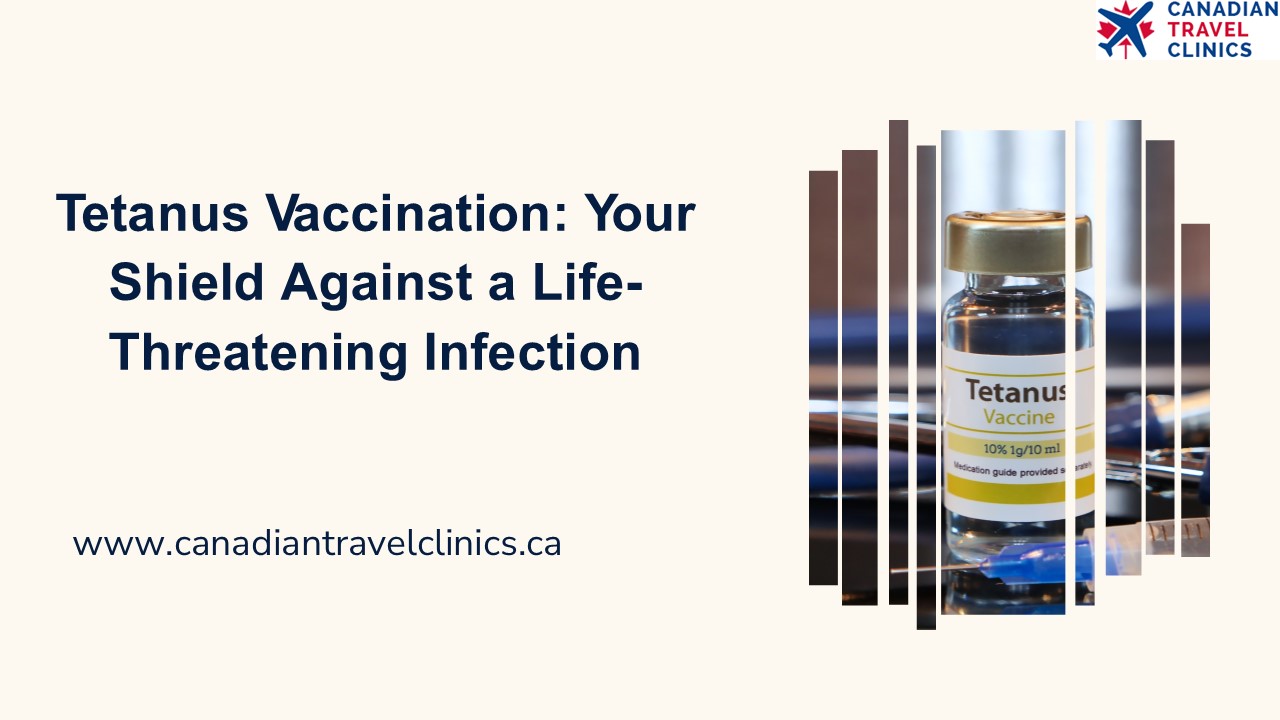Tetanus Vaccination: Your Shield Against a Life-Threatening Infection PowerPoint PPT Presentation
Title: Tetanus Vaccination: Your Shield Against a Life-Threatening Infection
1
Tetanus Vaccination Your Shield Against a
Life-Threatening Infection
www.canadiantravelclinics.ca
2
Introduction to Tetanus
Tetanus, commonly known as lockjaw, is a
life-threatening bacterial infection caused by
Clostridium tetani. The bacteria release a toxin
that affects the nervous system, leading to
muscle stiffness and spasms. It is not contagious
but can cause severe complications and death if
untreated.
3
Discovery of Tetanus Vaccine
The tetanus toxoid vaccine was developed in 1924.
German physiologist Emil von Behring was involved
in the discovery of the first effective
therapeutic serum against tetanus. Later
advancements resulted in the development of the
vaccine, with notable contributions from Pierre
Descombey, Gaston Ramon, and Alexander Glenny,
who made significant improvements, including its
refinement for combination use with diphtheria
and pertussis vaccines (DTP).
4
Symptoms of Tetanus
- Tetanus symptoms typically appear 3 to 21 days
after infection. Key symptoms include - Painful muscle stiffness, especially in the jaw
and neck. - Difficulty swallowing.
- Muscle spasms can spread to the chest, abdomen,
and limbs. - Fever and sweating.
- Rapid heartbeat and high blood pressure in severe
cases.
5
How Tetanus Spreads
Tetanus bacteria are found in soil, dust, and
animal waste. Infection occurs when the bacteria
enter the body through
Deep cuts or puncture wounds (e.g. from nails or
splinters).
Burns or other injuries that break the skin.
Contaminated objects or environments.
Tetanus is not transmitted from person to person.
6
Why You Need Tetanus Vaccination
Once symptoms appear, there is no cure, that is
why tetanus vaccination is crucial. Important
reasons to get vaccinated include
- The vaccine protects against the toxin produced
by Clostridium tetani. - Everyday injuries can expose you to bacteria,
especially in outdoor or rural areas. - Ensures protection in areas with limited access
to medical care.
7
Why You Need Boosters
- Immunity from the initial vaccine decreases over
time.
- Boosters maintain protection against tetanus if
exposed
- When combined (Tdap), they offer extra protection
against - diphtheria and pertussis.
8
Importance of Tetanus Vaccination Worldwide
Global Eradication Efforts
Neonatal (newborn) Tetanus
- Remains a challenge in some developing regions.
Vaccination of pregnant women and improved
hygiene during childbirth can prevent this.
- Organizations like the WHO and UNICEF promote
global vaccination programs to reduce tetanus
cases.
9
Key Considerations for Specific Groups
- Routine Schedule for Children Administered as
part of the DTaP vaccine series starting at 2
months old. - Special Groups Travelers, healthcare workers,
and individuals with high-risk occupations should
prioritize vaccination. - Post-Exposure Prophylaxis In cases of suspected
exposure, immediate vaccination or tetanus
immunoglobulin may be administered.
10
Conclusion
Tetanus vaccination is a critical public health
measure that prevents a potentially fatal
disease. Keeping vaccinations and boosters
up-to-date ensures lifelong protection and
contributes to global efforts to reduce tetanus
incidence. Always consult your healthcare
provider for guidance on your immunization
schedule
11
Tetanus won't stop youprotect yourself and enjoy
the world! Contact us now.
1 888 672 0005
www.canadiantravelclinics.ca
info_at_canadiantravelclinics.ca

